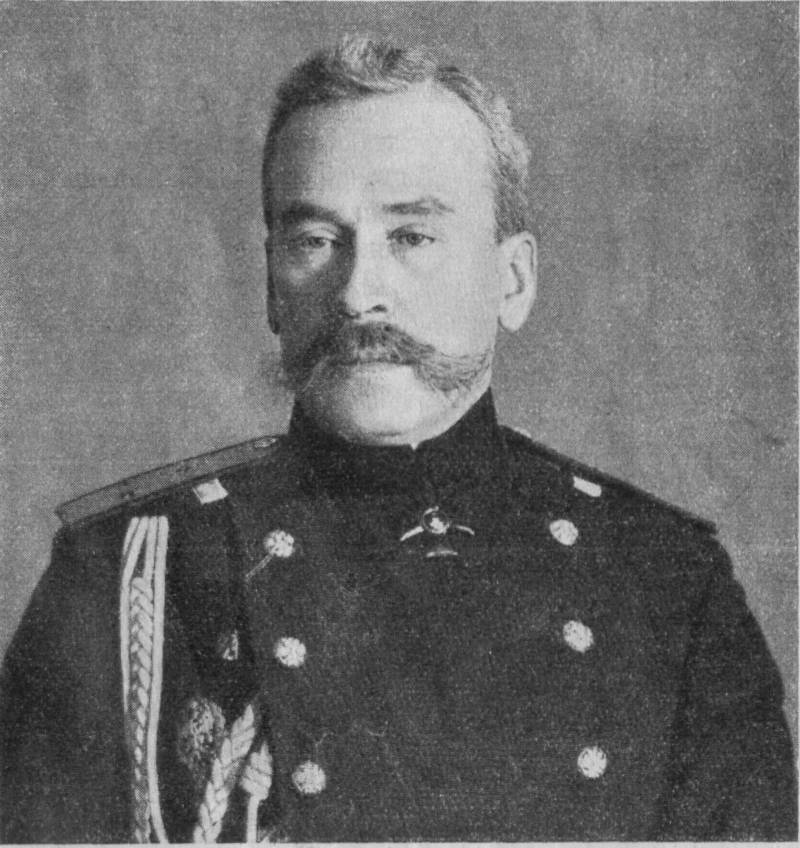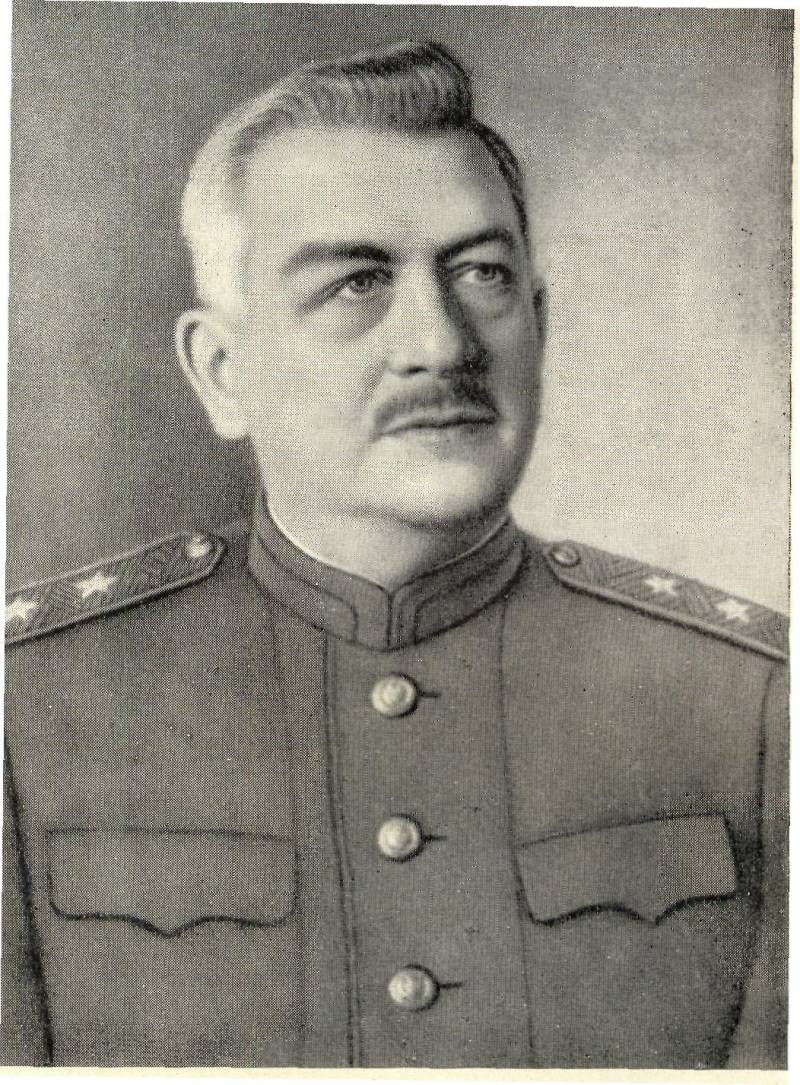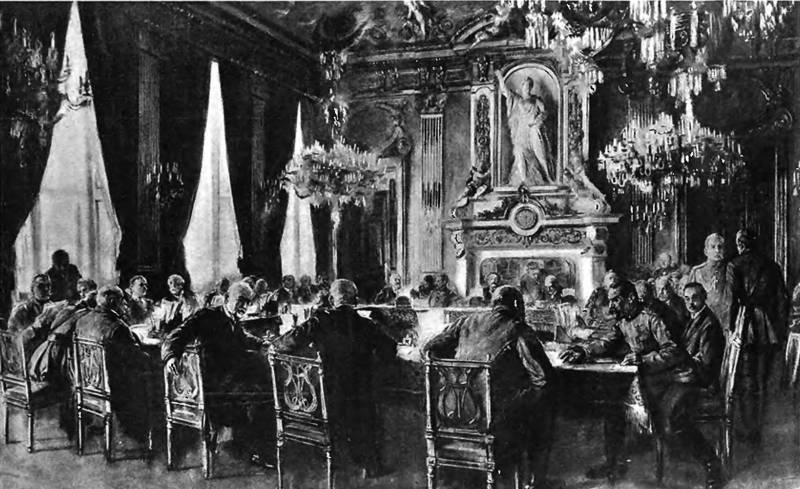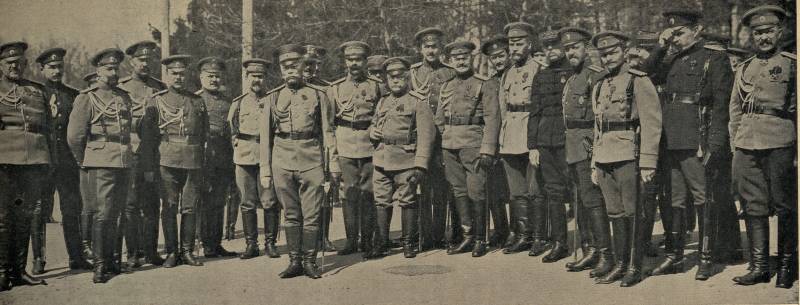Chantilly. Part of 2
6. Ya. G. Zhilinsky - cavalry general, represented the Russian command in the Allied Council. Participant of conferences in Chantilly.
Accordingly, the unification of the actions of the allies was of paramount importance.
Thus, in the program of the conference proposed by the French for familiarization with the Chief of Staff of the Supreme Commander of the Russian Army, M. V. Alekseev, it was:
“1) Review of the situation in the main theaters of military operations.
2) ... Conditions for the successful achievement of unity (connectedness) of actions in the main theaters of war. ...
4) Examination of the necessary measures to ensure that the Allied armies of the Allied armies maintain permanent ties and unity of views, both in terms of military measures to be taken and in the political and economic measures to be offered to their governments. ... it would be desirable in this regard - the creation, for example, in the French main apartment of a permanent body ... having in its composition officers from different armies ... "[N. N. Valentin. Decree. cit. C. 81-82].
It was about creating the prerequisites for the formation of a single Supreme Allied Command with all the armed forces of the Entente on the front lines.
Interestingly, in the circles of the military-political leadership of Russia, the question of the concentration of such a command in the hands of a Russian general was discussed. In support of this point of view, it was noted that Russia is the least vulnerable, possesses the largest supply of people (weapon weakness is a disposable thing), the Russian army is on the most favorable operational lines to Berlin and Vienna. And the army, operating on a broad front under conditions of a maneuvering war (i.e., Russian), has priority over armies that have been buried in the ground and are leading a positional war on a narrow front (i.e., Anglo-French-Italian). Reference was made to the experience of the 1812-14 wars.
Speaking about the outcome of the conference, Ya. G. Zhilinsky described the French command and its strategy as follows: Joffre "is completely absorbed in preparation and is so slow that it is not possible to move him to attack before the time fixed at the meeting, that is, before spring. hopes and opportunities. You can't count on it at all. From the contemplative immobility of the French, only the Germans can withdraw. ”
The attempt to unite the actions of the allies has not yet yielded concrete results - but the Second Conference in Chantilly adopted general, fundamental decisions on this issue. In addition, the Allies have begun to implement a peripheral strategy in the framework of the coalition war. Their actions in the East are becoming increasingly important, and the question of organizing the Thessaloniki Front was central to the discussion of the all-Union plan.
The third conference in Chantilly (28, February 1916) dealt with the distribution of coalition forces and agreeing on the approximate dates of active actions of the allies in the 1916 campaign. She also had to find out whether the human and technical resources of each army corresponded to the role that was assigned to it in overall strategic planning. It was noted that, if necessary, it is necessary to transfer to the army, insufficiently equipped and equipped, an excess of material resources available in other armies.
The conference reviewed a memorandum prepared by the French General Staff - “Introduction to the March 12 meeting (in the new style - A.O.) 1916 of the year”.
This document stated: 1) the beginning of the battle of Verdun on the French front; 2) that Russia will be ready to attack the enemy no earlier than May, owing to the weak level of development of the railway infrastructure and the not quite favorable situation with regard to the supply of its troops; 3) considered the situation in other theaters and plans of the enemy.
The conference participants determined the estimated composition of the Allied armies by May 1 and July 1. It was considered expedient: 1) Due to the beginning of the Battle of Verdun, the Entente is dangerous to remain the inactive spectator of the exhaustion of the French army - the success of the general offensive would be compromised if France were not able to take part in it; 2) The French army must stand by all means, and the Germans will break on its defense; 3) The English army must concentrate most of the available forces on the French front - including from other theaters; 4) The Russian army must exert "as effective as possible" pressure on the enemy - to prevent him from withdrawing part of his troops from the Russian front, and, having linked the freedom of his actions, to begin preparing for the offensive. It was noted that: “Of course, there is no question of forcing our Russian allies to launch their offensive earlier than it is sufficiently prepared and until all the means are gathered to bring it to the end. But precisely, in view of the possibility of the necessary preparations, it seems to us that the Russian army must proceed to them immediately, in order to be ready to launch an attack with all the means at its disposal. ”
Limited tasks were assigned to the Italian army and Entente forces on the eastern fronts.
The most important circumstance was that the conference set the agreed deadlines for Allied activity in the 1916 summer campaign - the Russian army should be active in mid-May (old style), and the rest of the allied armies in two weeks. Life has made adjustments to these plans. Russia had to carry out 2 offensive (in March at Naroch, rescuing the French near Verdun and in May - the summer offensive of the South-Western Front), the Western allies began active operations only in summer.
Again, special importance was attached to the Balkan front and the economic blockade of Germany.
The Military-Political Conference on March 14th in Paris was closely connected with the Third Conference in Chantilly. It set its main task to move the allies to a common transition to the offensive, as well as solving issues of mutual assistance of the allies. A. Ignatiev noted the grandiose scale of this event [Ignatiev A. A. Decree. Op. S. 227]. The close connection with the Chantilly conferences has been emphasized. historical the wording of the main outcome of the Paris forum: "One war on a united front."
7. Count A. A. Ignatiev, Russian military agent in France, Colonel (Major General in 1917) participated in Chantilly conferences. Photographed in the form of Lieutenant General of the Soviet Army.
8. 14 Allied Conference. 03. 1916 in Paris.
3 On November 10, a new meeting of the commanders of the Entente troops took place in Chantilly. It was stated that the situation of the Germans on the French front was difficult, and that the Allies were favorable, and it was decided to use the first convenient opportunity to develop the operational and strategic advantages gained from the battle of the Somme, continuing the process of depleting enemy reserves. This should have been a preparation for the operation, which will be decisive. The Italian proposals were rejected, the French army changed the commander in chief - J. Joffre lost his place to R. Nivelles. At this conference, the Allied Allied Offensive plan was approved in February 1916.
This plan was not executed due to a number of objective factors - the February coup in Russia, the response of J. Joffrey from the post of Commander-in-Chief of the French armies, the German retreat to the Hindenburg line on the French front.
The 1916 campaign demonstrated the inadequacy of the current “Chantilly system” —that is, only the coordination of the Allies ’actions on the Entente. Indeed, thanks to the inconsistency of their military efforts, a real chance was missed to defeat the enemy this year. There is a need for joint planning and implementation of the common strategic plan of all the Entente powers. The preparation of the Allied Petrograd Conference began - for the first time since the beginning of the war, it was to be held on the Eastern (Russian) front. In this fact - an indirect recognition of the merits of Russia during the 3 years of a heavy war and the leading role of our state in seizing the strategic initiative of the Entente in 1916.
Inter-Alliance of Entente Powers in 1914 - 1916 (and the Chantilly conferences were their central link) characterized by deepening and increasing structuring. World War I 1914. - 1918 was a coalition war. This meant, among other things, that the Allies should remember each other during military operations, and should be guided, first of all, not by the narrow egoistic interests of their own front, but by the benefits of the coalition as a whole.
Although in practice, in coalition wars, all allies want, of course, victory to achieve the common goal of war, but at the same time, each of them is trying to shoulder the other ally’s most difficult work - World War I, unfortunately, is a clear proof of that.
Here it is necessary to say about the extreme difficulty of managing such a huge bloc as the Entente (a huge number of troops, various theaters of military operations with its own specifics, the entry of new allies into the war and the emergence of old ones, etc.) both in military and political aspects. If the unified management of forces and operations of the German bloc takes place already from 1915, then only from the end of 1915 did the Entente try to coordinate the actions of its forces, while the same command came only in 1918, which ultimately brought a military victory. The expansion of the Entente aggravated the control and coordination in the military and material aspects, but from a strategic point of view it gave certain benefits.
In the coalition war, the German bloc was viewed as a single enemy, a besieged fortress, and from the point of view of the blockade, it was necessary to win over all the states in the neighborhood of the enemy's countries - for his best siege. It was also necessary to organize common and simultaneous offensive actions or, at a minimum, to coordinate them in time and space, in order to prevent the enemy from using his internal operational lines. This is the logic of the coalition war for the Entente in 1914 - 1918. But this method was very difficult to apply if the control of the hostilities was not centralized. In the first years of the war, centralization was absent, which resulted in the fact that the superiority of the Entente forces over the forces of its opponents during the most important period of hostilities, especially until the war took positional forms, was not fully utilized.
The allies tried to compensate for this by organizing numerous contacts and holding periodic meetings between the commanders-in-chief, but coordination is not centralization. It was also impossible to properly regulate the differences between the allies (state sovereignty is the most important problem). This gap was partially filled only at the end of 1917 by the creation of the Versailles Committee and in 1918 by the establishment of a unified command on the Western Front. The superiority of forces and means only from this moment became an important factor in the success of the Entente and brought her victory closer.
The interaction of the Allies on the Entente developed systematically - it concerned the development of both forms of interaction and their content. The Allies went from attaches and military representatives (1914 campaign) to military diplomatic and military missions, as well as inter-allied conferences (1915 campaign - 1917 campaigns). From information and coordination to general planning and the unified implementation of strategic plans, this was the outcome of the military-political interaction of Russia and its allies.
The conferences only coordinated the interests of the coalition participants, but, unfortunately, Russia did not find the highest point of the integration of the allies' military efforts - the establishment of a single command over the armies of the Entente powers.
9. MV Alekseev with representatives of the Allied armies (standing in front). MV Alekseev - General of Infantry, in the period under review, Chief of Staff of the Supreme Commander-in-Chief of the Russian army. Member of military-diplomatic communication with the Allies on the Entente.
The system of conferences held at Chantilly was of paramount importance for the formation of a unified system for managing such a large military-political bloc as the Entente. If the first conference addressed the issues of military-economic assistance to Russia in the 1915 campaign, then all subsequent ones discussed and solved general strategic issues that were important for the coalition as a whole - problems of strategy, distribution of Allied forces and coordination of approximate dates for conducting military operations.
The integration of the Entente in the context of the coalition war is the most important conference held in Chantilly to achieve a common victory for the Allies over the German bloc.




Information